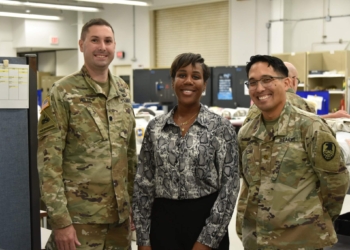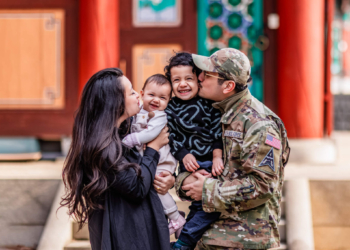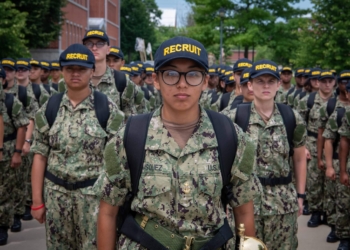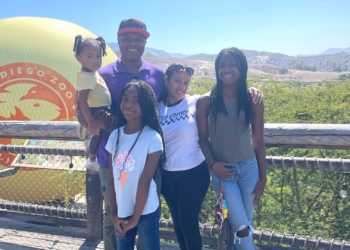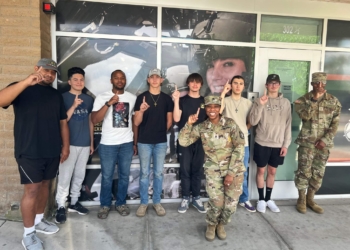Chief Master Sgt. of the Air Force Kaleth O. Wright wasn’t always on a path to the Air Force’s top enlisted position. As a young airman in the early 1990s, he was, in his own words, a “bad apple.” He describes himself as having been undisciplined with a bad attitude. He got in fights and was frequently late for work as a result of nights spent drinking.
“I really wasn’t doing well at all,” Wright said during a phone interview.
The intervention of a mentor changed that. A technical sergeant named Joe Winbush took an interest in Wright and helped shape his career and outlook on life. Wright says he came to see Winbush as a father figure and still maintains a relationship with him.
“Pops” — as Wright came to call Winbush — treated him like family, held him accountable for his actions and encouraged him to become more than just a bad apple.
“The years under his wing — his tutelage — really made me not just the NCO, but the man I am today,” Wright said.
It was Winbush who encouraged Wright to join the honor guard at Pope Air Force Base, North Carolina, which he credits as one of the formative experiences in his career.
“That was a game–changing experience for me. I had to do just a ton of memorial services, a ton of funerals for veterans, and one in particular I got to present the U.S. flag to a spouse,” Wright said. “I locked eyeballs with the spouse. Right then I decided that I needed to take my life and my career more seriously. That was the beginning of my transformation from a bad apple to trying to make something of myself.”
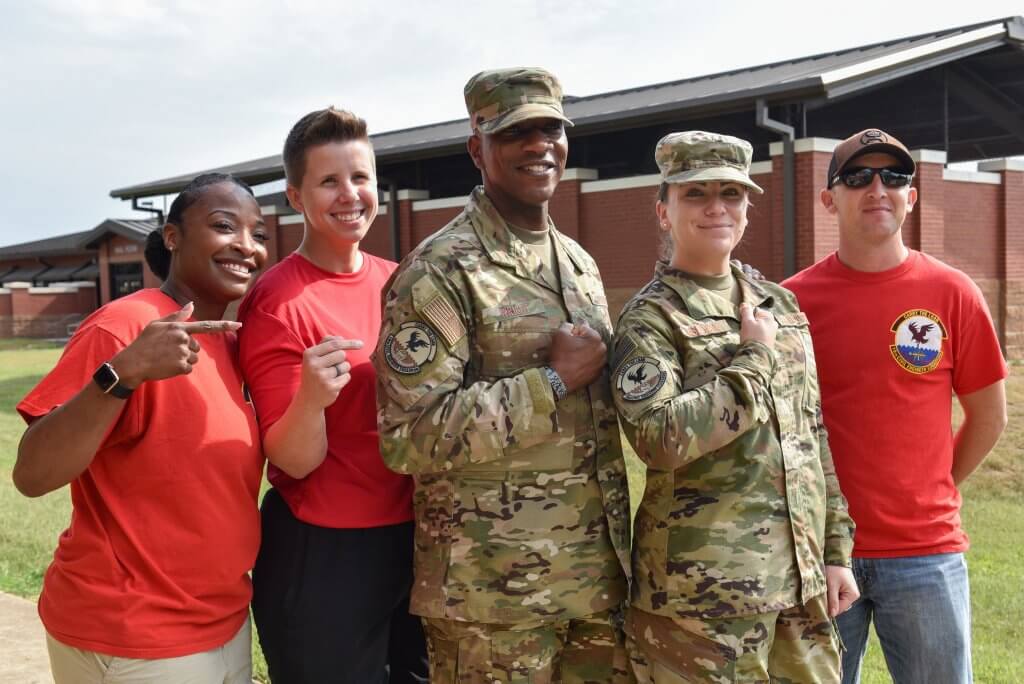
Wright’s career included stops in Korea, Japan, Germany and Alaska. He’s had combat deployments in Operations Desert Storm, Desert Shield and Enduring Freedom. He’s earned numerous academic degrees and professional certifications. But his rise to the top of his profession wasn’t without obstacles.
At one point, while a senior master sergeant, Wright got into a verbal altercation with a chief master sergeant during which Wright said some “unprofessional things.” The result was a bad performance report without a senior rater’s endorsement.
“The first time I competed for promotion to chief, I had about the lowest score you could get,” Wright said. “I had never seen anyone recover from a situation like mine. I was kind of down in the dumps.”
His failure to get promoted led to a decision to leave the service. Feeling sorry for himself, he started the transition back to civilian life. A senior airman who worked for him at the time questioned the decision.
“He called me a hypocrite,” Wright said. “He basically told me that, ‘hey man, whenever we go through things, you’re always telling us to hold your head high, see it through. Be strong. Now you’re going through something and you’re quitting on us.’ That was a powerful, kind of transformative moment in my career. After that conversation with this young man, I decided to stop feeling sorry for myself. I decided to figure out, hey what’s the lesson for me here.”
He reminds other airmen that failure can be a good thing if they learn from it.
“It’s all about how you bounce back. Perseverance and grit are an incredible part of success,” Wright said. “You don’t realize it, but sometimes you need to fail in order to understand success. … And when you’re in the midst of something like that, you don’t really want to hear the wisdom of some old sergeant major or chief telling you, ‘hey it’s okay you needed to fail’ …”
Like many senior NCOs, Wright has a lot to say about mentorship, such as senior service members have a responsibility to identify junior individuals who have potential and give them encouragement. They also have a responsibility to identify those who struggle and give them guidance.
“Senior members have a responsibility to identify the young folks; the ones that have potential and they’re showing it and they might just need a little bit of a push to the left or right to be successful,” Wright said. “Then you have the young folks who you believe have potential but they’re not living up to it and you just want to drag it out of them. … There’s also the individual that makes you think, ‘hey man, this guy is getting ready to crash and burn.’ You need to help them get to where they can at least stay in the Air Force or you can help them transition out.”
Wright also advises junior airmen to take some responsibility for seeking guidance from those outside the scope of their daily work.
“You know, as you walk around base, you may be in the dining facility or the business center — you may be in the military personnel section getting a new ID card — you could be anywhere,” Wright said. “It could be as easy as, ‘hey I really like the way that you do this or the way that you take care of your people; do you mind if we grab a coffee and I ask you a couple of questions.’”
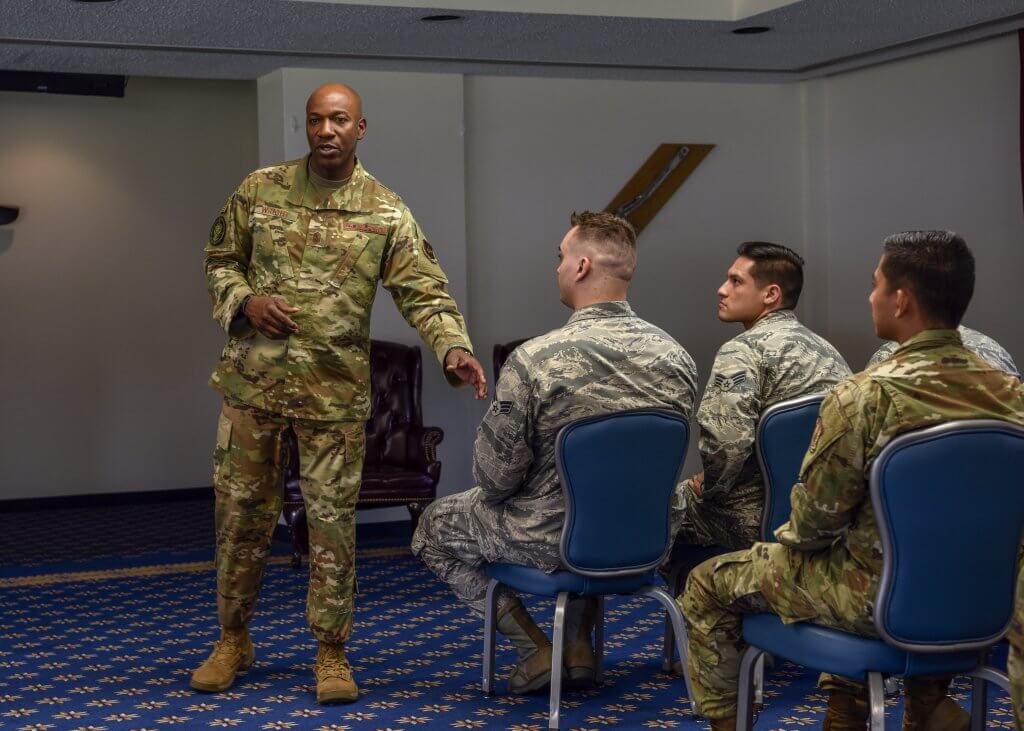
Mentorship is part of his leadership philosophy, too, which consists of three components:
-
Set high standards.
-
Challenge people to measure up to these high standards.
-
Exemplify and model the behavior you expect.
Wright has some straightforward advice about career progression for young airmen who should proceed in their careers step-by-step, he says.
“If you’re a young airman and you want to be successful, before you can become the chief master sergeant of the Air Force, if you’re an E–2 you’ve got to do what’s necessary to make E–3,” Wright said. “Once you get that squared away make E–4.”
He said he doesn’t necessarily encourage service members to think and act linearly, instead he pushes them to embrace a philosophy of “dream big, focus small.”
“I decided when I was a senior airman in the Air Force that I was going to be a chief; that I was going to make E–9, but I also understood that in order for me to get to E–9, I’d first have to get to E–5. I’ve got to take care of things that are right in front of me, but I always had that big goal,” Wright said. “The power of having a BHAG (Big Hairy Audacious Goal) is, there were times along my journey when things happened, and I wanted to quit. I didn’t get the promotion. I didn’t get the assignment. I didn’t get selected for some job. I didn’t win an award. But I think having a goal, saying to myself, and really having my friends saying to me, ‘hey man you can’t quit because remember you said you were going to be a chief, so you’ve got to get over this and you’ve got to keep going.’ There’s a huge advantage to dream big, focus small.”
While he eventually achieved his dream, the real highlight of his career was the relationships he’s had with the people around him. He plans to retire later this year and put his executive coaching certifications to work for two years, mentoring corporate leaders and “helping them become the best versions of themselves.” Following that, he wants to open a cigar lounge and scotch bar in Dallas, Texas.
And he is happy with the legacy that he leaves behind in the Air Force.
“I would say that our (Wright and Air Force Chief of Staff Gen. David L. Goldfein) legacy during my time would be that we created a culture where every airman feels like they can thrive. Every airman feels like they can become the best version of themselves. It’s kind of hard to explain but at least from my perspective, I’ve seen a little bit of a cultural shift,” Wright said. “Maybe a phenomenon even, of how people feel about their service; how they feel that we’ve actually listened to their feedback. We’ve actually made changes that are relevant to them. We’ve been incredibly accessible through social media. I think that’s what people will remember about our time in the office. I think people will remember that we changed the culture during our time.”

















